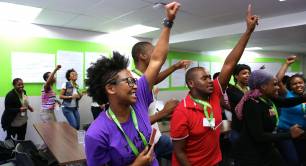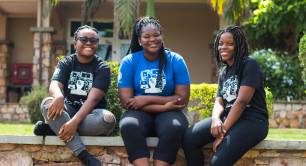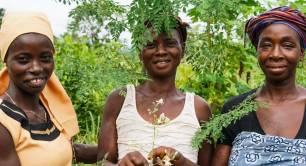Generating jobs in Ghana – with social enterprise
A pilot training programme for young people in Accra has spread the word about social enterprise, and has proved phenomenally successful.
Ghana’s young people need jobs. According to the World Bank, the country faces 12% unemployment and more than 50% under-employment among its 15 to 35-year-olds – putting it in a more critical situation than many other Sub-Saharan African countries. And those figures were compiled before the full impact of the Covid-19 pandemic has been calculated: millions of jobs are now estimated to be under threat around the world.
And with Sub-Saharan Africa’s growing population of young people, more jobs are needed every year. Currently, young people make up more than one-third of Ghana’s population, and more than half of these young people live in the cities. There’s an opportunity here for Ghana to harness this “demographic dividend” – when there is a bigger working age than non-working age population – to boost its economic growth.
- READ MORE about how social enterprise can tackle unemployment in our in-depth feature Fresh solutions for Africa’s jobs challenge
But, as the World Bank pointed out in a study published last year, most jobs in Ghana are currently low skilled and low quality, meaning that employees don’t have many opportunities to earn a decent wage or gain job security and social protection for their families. A transformation of Ghana’s economic structure as well as its education and training systems is vital.
A project called Enhancing Employability for Urban Youth, run by the British Council, aims to get some younger members of the workforce moving in the right direction. It began in Accra in October 2019 as a pilot, with the goal of initially reaching 1,000 people between the ages of 18 and 35. The aim of the programme is to help young men and women in the city to develop the skills they need for today’s rapidly changing jobs market and, in particular, to support them to develop or grow their own social enterprises.
In spite of participation being interrupted by the pandemic, the programme has been a phenomenal success, according to Andrew Entsua-Mensah, social enterprise project co-ordinator at the British Council in Ghana.
“We wanted to bridge the employability gap and to help young people define their enterprises and make an impact,” he says.
“A lot of programmes in this area focus solely on entrepreneurship. For us at the British Council it is use of this entrepreneurial mindset and business model to address social and environmental issues as well – social entrepreneurship. The feedback from the participants has been amazing.”
Reaching hundreds of young people
The programme received an initial 986 applications. Of these, 700 people were selected to attend a bootcamp. After that, 200 went on to an intensive two-month business incubation stage, and finally 20 of them (16 women and four men) participated in a two-month business acceleration programme as well as receiving seed funding of 5,000 Ghanaian cedi (around 700 euros) from the British Council.
During the programme, the participants learned about the fundamentals of business, such as marketing, examining their customer base, finances, leadership and communications.
Additionally, social enterprise was explained and explored, alongside specific training around business models for social enterprise and impact measurement. “The concept of social enterprise isn’t well known in Ghana,” says Entsua-Mensah.
Ten of the business incubation participants were sponsored by the British Council to attend the Impact!Africa Social Entrepreneurship Summit in December 2019 in Kenya, and some were able to log on to the digital version of the Social Enterprise World Forum in September 2020.
Had they not gone into social enterprise, they would have been looking around for jobs
There is a growing social enterprise community in the country, and through Social Enterprise Ghana there are regular opportunities for networking and support. The 20 finalists used some of their seed funding to register as part of the network’s social enterprise directory, and they were supported to fully register their businesses with the authorities.
Remarkably – and in spite of the interruptions to business from the pandemic – all 20 finalists are still running profit-making businesses.
One of the problems the fledgeling social entrepreneurs might face going forward though, as identified by an independent evaluation of the programme, is Ghana's lack of policy around social enterprise. However, Entusa-Mentsah points out that the British Council and others are lobbying for social enterprise to be incorporated into policies that are currently being developed around micro, small and medium-sized enterprises.
Entsua-Mensah judges the pilot a success and says that plans are now under way to take forward a larger project.
“Had they not gone into social enterprise, they would have been looking around for jobs,” he says. “Now they are employing other people and bridging the employment gap that we have.”
Cesi Thompson, Our Chow
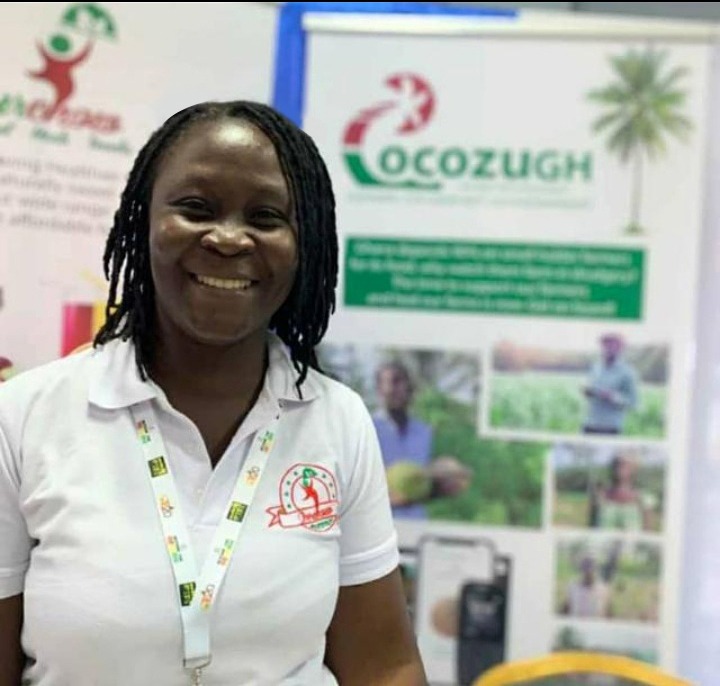 Cesi Thompson, aged 34, is the founder of healthy foods company Our Chow.
Cesi Thompson, aged 34, is the founder of healthy foods company Our Chow.
The idea began several years ago when she struggled to find affordable, healthy dishes for herself during her working day, but realised that simply cutting out some of the typically salty, oily or sugary Ghanaian dishes helped her lose weight.
In 2014, while unemployed, she turned her cooking hobby into a full-time occupation, registering her business a year later. The goal was not only to improve the diets of Accra’s office workers with nutritious juices, salads and sandwiches, but also to make an impact through her choice of employees – vulnerable young women who the business provided with free lodgings and training, plus a small monthly wage which they could save for their future education.
Thompson’s desire to make a difference was inspired by her own experiences. “I have been a victim myself where someone wants to help you, and because it’s a male and you’re female they want to take certain advantages,” she says. “The first girl I took in had been impregnated by a guy and left to fend for herself, so I took her in with her child.”
At first the enterprise flourished, selling about 200 juices a week as well as catering for weddings.
I was down to my knees. Psychologically, this programme gave me hope
But soon came a trio of challenges. Thompson invested in new equipment, which got stolen – “a breaking point for us” – and the financial strain meant she had to make two of her employees redundant. In January 2020, she had to take time off to undergo surgery; then Covid-19 hit.
The Enhancing Employability for Urban Youth programme was “one of the best things that happened to me”, she says. She learned about managing her finances, and about the importance of getting her business online. As a “serious introvert”, she says she’s also realising the need to “be a bit more sociable in networking”.
Above all, it provided a morale boost when she most needed it.
“I was down to my knees... I didn’t know what to do next. Psychologically, it gave me hope, that was very important,” she says.
In December 2020 she felt confident enough to take on a loan from her mother, which enabled her, with support from the British Council, to exhibit her goods at the Ghana Trade Exhibition in Accra; she sold everything, and was able to repay the loan and invest in more produce.
Her future plans include further developing a new strand to the business (working with rural coconut producers), finding a business partner and raising more finance. Ultimately, she hopes to employ 10 to 15 people – because the need for decent jobs is huge.
“There are so many youths that are giving up and taking to all sorts of available choices to survive,” she says.
Interview by Anna Patton
Gloria Adelaide Sosu, Sickle Cell Community Africa
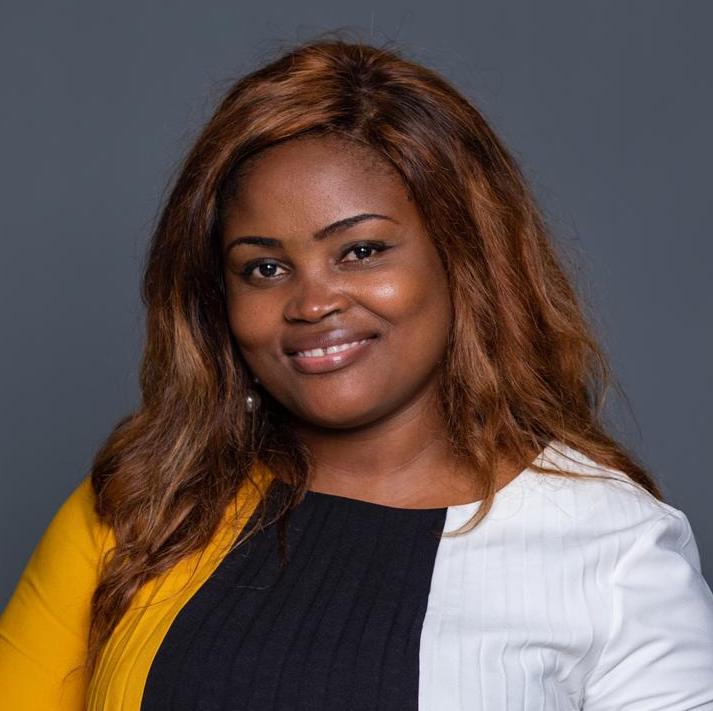 Gloria Adelaide Sosu is the founder of Sickle Cell Community Africa (SCC Africa) which provides testing for sickle cell disease and raises awareness about the illness.
Gloria Adelaide Sosu is the founder of Sickle Cell Community Africa (SCC Africa) which provides testing for sickle cell disease and raises awareness about the illness.
Sickle cell disease is an inherited blood disorder which causes red blood cells to become sickle-shaped and rigid, making it difficult for them to circulate in blood vessels, leading to serious problems including strokes, infections and pain. It is particularly prevalent in Sub-Saharan African populations.
To initiate life-saving therapies, early diagnosis is key, but in many cases the illness is deadly. In Ghana each year, 2,000 babies are born with sickle cell disease, according to estimates quoted by Sosu.
“This is really affecting livelihoods,” Sosu says. “It’s breaking families up, and really affecting communities.”
Sosu, 35, started the project because she comes from a sickle-cell family herself – out of a family of five, there are only two surviving children: her older sister and herself.
“It took away the life I had as a family. I witnessed my little brother having six different injections, in one day,” Sosu said. “That is something in my heart that I wanted to do. It’s my passion to see it move forward and reach out to many others so that they can know about sickle cell disease.”
In addition to awareness-raising, SCC Africa’s main activity is to conduct quick-testing for sickle cell disease. Sickle cell screening used to be a complex process, requiring people to have a blood sample taken to be processed in a laboratory. But Sosu found an American company had developed rapid test kits, allowing SCC Africa to reach many more people.
Sosu explains that this was crucial, especially among young people – testing may reveal that they are healthy carriers of the disease, which means that they are 50% at risk of passing it on to their children if the other parent is a carrier as well.
This is something in my heart that I wanted to do. It’s my passion
Being part of the Enhancing Employability for Urban Youth programme has enabled Sosu to build a sustainable enterprise while continuing to pursue her mission.
“It taught me how to bring my idea into fruition, how to develop my business plan,” she says. The seed capital, she says, has allowed her to register the company and be “investor-ready”.
SCC Africa was about to launch its first mass-testing project in secondary schools when Covid-19 hit, so this had to be put on hold until the pandemic slowed down. The virus was also grabbing all the attention, making it more difficult to raise awareness about SCD, Sosu says.
“Today, Covid is the talk of the town, it’s the disease that is killing people.” Sickle cell disease has also taken many lives, she says, only not in such a short timespan. For now, the enterprise is focussing on awareness creation campaigns and counselling online.
But Sosu is hopeful that the testing will take off post-Covid.
“We have the vision to reach out to many other African countries”, with the help of ambassadors and representatives, she says. Linking with other organisations doing similar work will allow them to build a real “community of sickle cell organisations”. Rolling out quick-testing screening across the continent will lead to a lot of progress, and also create skilled employment opportunities for young people to conduct the tests, Sosu added.
“It’s my passion. It’s not something I could stop doing, with or without support,” Sosu said.
Interview by Laura Joffre
Benjamin Dzamesi, High School GH
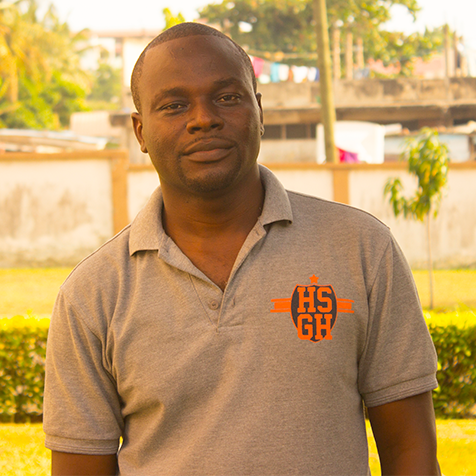 Benjamin Dzamesi is the founder of High School GH, a social enterprise that supports young people to achieve their ambitions through employability and entrepreneurship training.
Benjamin Dzamesi is the founder of High School GH, a social enterprise that supports young people to achieve their ambitions through employability and entrepreneurship training.
High School GH aims to make young people “work-ready” by teaching them how to prepare a CV, apply for jobs and develop interview skills. The enterprise also provides support for entrepreneurs, to help young people build, scale and lead small and micro-enterprises, and trains them with financial literacy. It runs a mentoring programme, where young people are matched with experienced professionals and given work experience opportunities.
Dzamesi, 35, comes from a poor background. He lost his parents at 12 years old, and had to start working at a young age. A job running an internet cafe gave him the opportunity to learn a lot online – most of the time by watching videos on YouTube – and he started his own small web design business. While volunteering with a company that sold contraception, he met a lot of young people and realised that many were looking for the opportunities that he never had. Young people have “brilliant ideas”, Dzamesi says, but they are rarely listened to, so he decided to find a way to help them.
He started an NGO providing mentoring and support for young people in 2015. A partnership with Google Ghana enabled the organisation to provide digital skills training to about 6,000 senior high school students, and financial literacy programmes to about 1,500 young people.
But Dzamesi had to rely on grants and donations to deliver activities and programmes. The Enhancing Employability for Urban Youth programme enabled him to remodel his idea and run it as a sustainable business.
“I’m still making an impact, and then the money that I’m making goes on to continue the work to support more people,” Dzamesi says. “It taught me a lot of things like the marketing aspect of a social enterprise and also how we could align our project and ideas with the SDGs [the UN Sustainable Development Goals].”
The seed funding enabled him to register the company and buy a new laptop.
In Ghana we should encourage young people to bring the energy to help the country grow
Dzamesi had developed training programmes which were meant to happen face-to-face in schools and other venues. Everything had to be put on hold after Covid-19 hit, but it brought the idea that training could be done online, with the potential to reach people beyond Accra. After a few months spent developing it, the digital programme is set to launch in March 2021.
“It’s given us the opportunity to really expand in a way that would have taken us four or five years if we were only doing face-to-face training,” Dzamesi says. In five years’ time, High School GH is planning to reach a minimum of 1m young people – something that would have been unthinkable without the move online.
Dzamesi said he believes young people have the ideas and potential to move the country forward.
“In Ghana the energy of young people is not harnessed,” he added. “We don’t encourage them to contribute until they become an adult...we should encourage young people to bring the energy to help the country grow.”
Interview by Laura Joffre
Header photo: Aspiring social entrepreneurs participating in Ghana's Enhancing Employability for Urban Youth programme met up last year in Accra to share ideas, participate in debates and showcase their products


